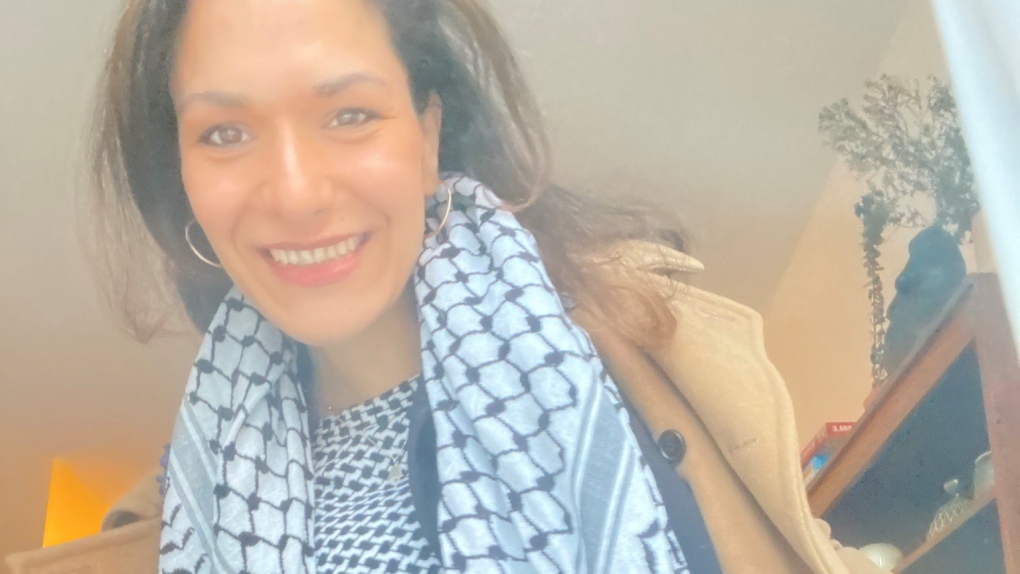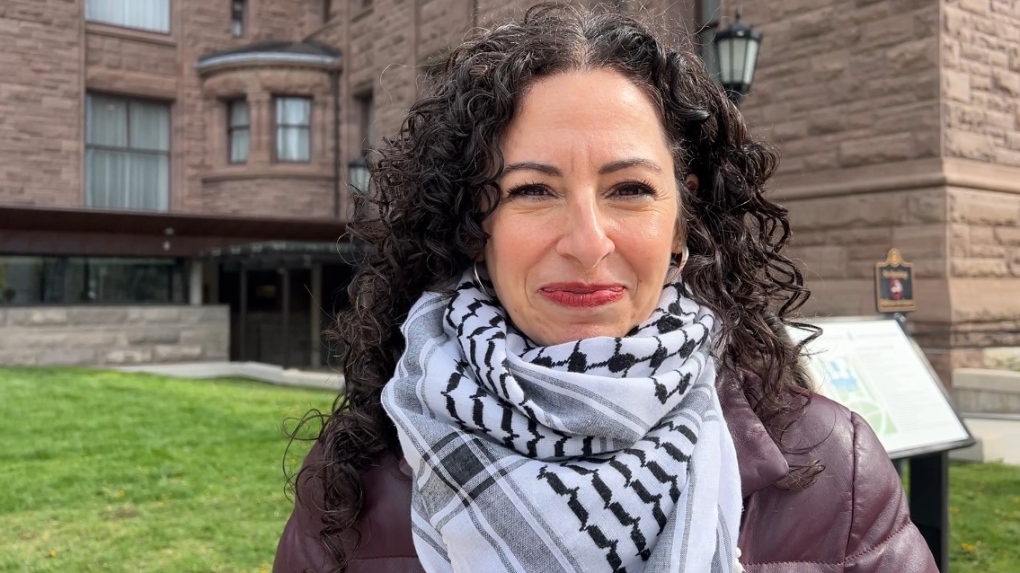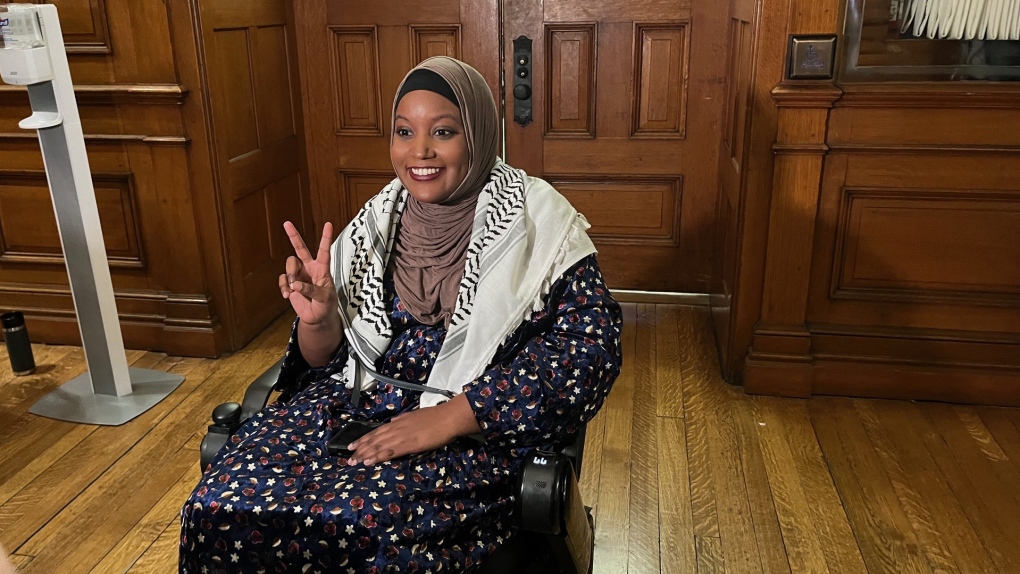People who are banned from entering the Ontario legislature while wearing a keffiyeh say the garment is part of their cultural identity, and the only ones making it political are the politicians who ban it.
On Monday, Kitchener resident Beisan Zubi drove to Toronto to listen to Question Period, but was not allowed into the building because he was wearing a keffiyeh.
The scarf, he said, belonged to his mother.
“He’s older than me. This is something that has been passed on to me. I’m very proud of it,” she told CTV News Toronto.
He said he was shown a printed letter that said no visitor to the legislative assembly would be allowed to wear the keffiyeh.
“Taking into account the geopolitical situation in the Middle East, the keffiyeh now has strong political connotations affected by the Israeli-Palestinian conflict and wearing the scarf in the Legislative Assembly would be considered a political statement.”
“I was confused,” Zubi said. “Is this the only culture, you know, where it’s forbidden? Supossely Yes.”
She says it seems as if the government is telling Palestinians they are not welcome in the legislature.
“Are you telling me I shouldn’t be proud? Are you telling me I can’t participate in our political arenas? What is the message here,” she said.
“That is not appropriate. “That is not something any elected official should say with pride.”

On Tuesday, the Ontario New Democratic Party attempted a second time to gain unanimous consent to repeal the ban, but the motion failed.
House Speaker Ted Arnott told reporters that he heard some “no’s” and therefore could not take any action. Arnott was the one who originally instituted the ban, arguing that there is a “longstanding” policy on the use of political symbols in the House.
Premier Doug Ford has publicly said he does not support a keffiyeh ban and has asked the speaker to reverse his decision.
However, he said he would not force members of his party to vote a certain way.
“Members of the group are free to support or oppose the NDP motion,” a spokesperson said Tuesday.
What is keffiyeh?
The keffiyeh is a square scarf traditionally worn by Palestinians, Muslims and Arabs. It has come to symbolize solidarity with the Palestinians in the midst of the Middle East conflict.
However, for many the scarf is part of who they are.
“It’s something our ancestors have used for generations. For me, it has become something I turn to for comfort, pride and identity,” Dania Majid of the Arab Canadian Lawyers Association told CTV News Toronto.

Majid was part of a group scheduled to meet with NDP Leader Marit Stiles to discuss anti-Palestinian racism on Tuesday. They were told they could not enter the legislature wearing their keffiyeh.
The group refused to do so and instead held the meeting outside Queen’s Park.
“They are literally stripping me of my dignity and that is why we decided that we would not take off our keffiyeh to enter,” Majid said as he stood outside the building.
Zubi also describes the scarf as a comfortable garment and notes that Palestinians are raised to be aware of their history and keep it close to their hearts.
“The keffiyeh is a symbol for the Palestinians and it is for the Palestinians. So when non-Palestinians try to define it, defame it or change its meaning, it is obviously extremely offensive and discriminatory,” he said.
“We do not allow other members of other groups to have their cultural dress defined by people who do not belong to that cultural group.”
According to Zubi, the symbols on the scarf symbolize commerce and agriculture. He also acknowledged that it is sometimes used by non-Palestinians in solidarity with the people.
Is it political?
Arnott has previously defended his decision. saying that the use of the keffiyeh is “clearly intended as a political statement” at the current time.
“It’s extremely sensitive from a political point of view, obviously, but from a procedural point of view, I think I made the right decision in the sense of the past decisions of the spokespersons, the precedents and the traditions,” he told reporters. last week.
One of the members who voted against the motion is PC MP Robin Martin, who issued a statement on Tuesday saying he intends to continue voting against it.
“The legislature’s rules are clear: no accessories or clothing that makes a political statement can be worn in the chamber,” he said.
“These rules exist to maintain peace in our democratic institutions and to ensure that we use only our words to debate and persuade each other. “I believe these rules are important for the proper functioning of the legislature and must be respected.”
PC MP Lisa Macleod also voted against the motion, calling the scarf a “very divisive and political symbol in Ontario.” She also suggested the NDP’s motion to overturn the ban was anti-Semitic and ill-timed because of Passover.
“I think these tensions that have unnecessarily spilled over into the Ontario legislature have really been a distraction to the work that we’re supposed to be doing here,” he said.
Independent MP Sarah Jama wore the keffiyeh in the legislature on Tuesday despite the ban. Speaking to reporters, she called the ban ridiculous and said she had worn the scarf several times in the legislature before the ban.
“Cultural clothing can be made political,” he said, adding that the act of banning an article of clothing is also political.
“Targeting staff who were trying to enter the building and who are culturally affiliated with the scarf is incorrect. The prime minister even came forward and said this is wrong, so the president really needs to re-evaluate his decision on this matter.”

A group of protesters were kicked out of the legislature Tuesday for protesting after the NDP’s motion to overturn the ban was denied. Visitors to Queen’s Park began shouting when Government House leader Paul Calandra responded to questions about the ban by talking about his party having a “diverse group”.
The legislature went into a 15-minute recess.
When asked if the protest proves the speaker’s point that the keffiyeh has become a political symbol, Jama said no, explaining that individuals are doing what they consider necessary to make their voices heard.
